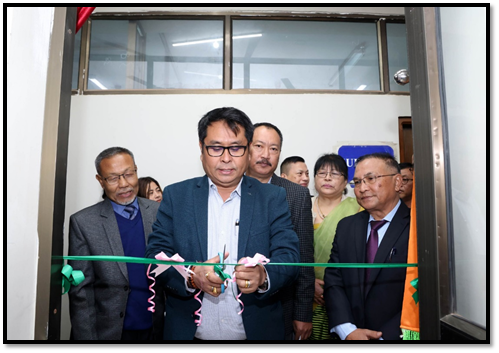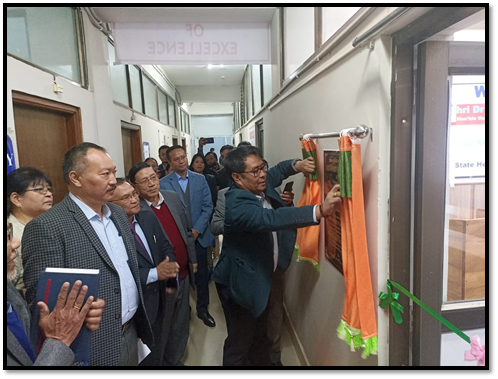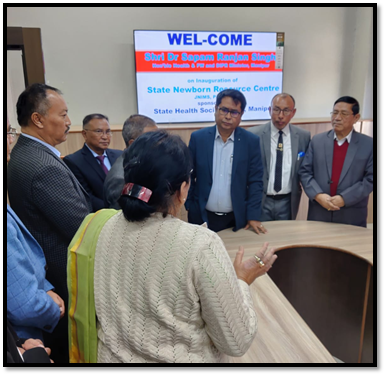PROGRAMMES UNDER CHILD HEALTH
1. Community Based Care for Newborn and Young Child
1.1 Home Based New Born Care (HBNC):
A new scheme launched to incentivize ASHA for providing Home Based Newborn Care. ASHA will make visits to all newborns according to specified schedule up to 42 days of life. The proposed incentive is Rs. 50 per home visit of around one hour duration, amounting to a total of Rs. 250 for five visits. This would be paid at one time after 45 days of delivery, subject to the following:
- recording of weight of the newborn in MCP card
- ensuring BCG , 1st dose of OPV and DPT vaccination
- both the mother and the newborn are safe till 42 days of the delivery, and
- registration of birth has been done
1.2 Home based care for young child (HBYC):
India witnessed a higher decline in maternal and child mortality compared to global average since the inception of National Health Mission (NHM). With the National Health Policy, 2017 in place, there is an unprecedented opportunity to build upon the gains made in the last ten years and achieve Sustainable Development Goals.
Malnutrition continues to be the underlying cause of death for 35% of Under 5 Mortality reported in India. The interaction between under nutrition and infection can create a vicious cycle of worsening illness and deteriorating nutritional status. Interventions promoting infant and young child feeding are known to improve child survival, growth and intellectual development. Numerous gaps and barriers are observed in the delivery and practice of IYCF recommendations.
Under National Health Mission, Child Health division, MoHFW, GOI has rolled out Home-Based Care for Young Child (HBYC) Programme as an extension of the Home Based New Born Care (HBNC) programme to promote evidence based interventions delivered in four key domains namely nutrition, health, childhood development and WASH (Water, Sanitation and Hygiene).
In Manipur, HBYC programme was rolled out in the year 2019 at Chandel which is an aspirational district. Further, the Ministry had approved to expand the same programme in the remaining 15 districts.
Under Home Based Care of Young Child (HBYC) programme, the additional five home visits will be carried out by ASHA with support from Anganwadi workers. ASHA will provide home visits on 3rd, 6th, 9th, 12th and 15th months to promote early initiation of breast feeding, exclusive breast feeding till 6 months and continued breast feeding till 2nd year of life along with adequate complementary feeding, prevention of childhood Pneumonia and Diarrhoea and to ensure age appropriate immunization and early childhood development . The quarterly home visits schedule for low birth weight babies, SNCU & NRC discharges will now be harmonized with the new HBYC schedule.
ASHAs will be provided incentive of Rs. 250 for completion of 5 home visits under HBYC for each young child (Rs. 50 per visit) as per the recommended schedule and additional commodities namely ORS packet and Iron Folic Acid syrup will be provided in the kit National Deworming Day, Newborn Care, IYCF& IDCF material
2. Facility Based Newborn and Child Care
Neonatal mortality is one of the major contributors (2/3) to the Infant Mortality. To address the issues of higher neonatal and early neonatal mortality, facility based newborn care services at health facilities have been emphasized. Setting up of facilities for care of Sick Newborn such as Special New Born Care Units (SNCUs), New Born Stabilization Units (NBSUs) and New Born Baby Corners (NBCCs) at different levels is a thrust area under NHM.
2.1 New Born Care Corners (NBCCs)
- These are 1 bedded facility attached to the labour room and Operation Theatre (OT) for provision of essential newborn care. NBCC at each facility where deliveries are taking place should be established. There are 69 NBCC for 69 delivery points in the state.
2.2 Newborn Stabilization units (NBSUs)
- NBSUs are established at community health centres /FRUs. These are 4 bedded units with trained doctors and nurses for stabilization of sick newborns. There 3 functional NBSUs in the state at DH Bishnupur, DH Chandel and SDH Mao (Senapati District).
2.3 Special Newborn Care Units (SNCU)
- State is required to set up at least one SNCU in each district especially at the district hospitals. SNCU is a neonatal unit in the vicinity of the labor room which will provide special care (all care except assisted ventilation and major surgery) for sick There are 5 functional SNCUs in the state.
- RIMS: 10 bedded
- JNIMS: 10 bedded
- DH Thoubal: 6 bedded
- DH Churachandpur: 6 bedded
- DH Ukhrul: 6 bedded.
2.4 Kangaroo Mother Care (KMC)
Kangaroo Mother Care is a low resource, evidence based, high impact intervention and standardised care for low birth weight infants which, like breastfeeding, should be part of routine care. It can prevent up to half of all deaths in infants weighing
Kangaroo Mother Care (KMC) is a simple method of care for low birth weight infants that includes early and prolonged skin-to-skin contact with the mother (or a substitute caregiver) and exclusive and frequent breastfeeding. This natural form of human care stabilizes body temperature, promotes breast feeding, prevents infection and other morbidities. This also leads to early discharge, better neurodevelopment and encourages bonding between mother and infant. KMC is initiated in the hospital and continued at home until the infant needs it and for optimum care a regular follow-up must be ensured.
Kangaroo mother care has following components:
- Skin-to-skin contact
- Exclusive breast feeding
2.5 Nutritional Rehabilitation Centres (NRC)
Severe Acute Malnutrition is an important contributing factor for most deaths amongst children suffering from common childhood illness, such as diarrhoea and pneumonia. Deaths amongst SAM children are preventable, provided timely and appropriate actions are taken.
Nutritional Rehabilitation Centres (NRCs) are being set up in the health facilities for inpatient management of severely malnourished children, with counselling of mothers for proper feeding and once they are on the road to recovery, they are sent back home with regular follow up.
2.6 Facility Based Integrated Management of Neonatal and Childhood Illness (F- IMNCI)
F-IMNCI is the integration of the Facility based Care package with the IMNCI package, to empower the Health personnel with the skills to manage new born and childhood illness at the community level as well as at the facility. Facility based IMNCI focuses on providing appropriate skills for inpatient management of major causes of Neonatal and Childhood mortality such as asphyxia, sepsis, low birth weight and pneumonia, diarrhoea, malaria, meningitis, severe malnutrition in children. This training is being imparted to Medical officers, Staff nurses and ANMs at CHC/FRUs and 24x7 PHCs where deliveries are taking place. The training is for 11 days.
2.7 Navjat Shishu Suraksha Karyakram (NSSK)
NSSK is a programme aimed to train health personnel in basic newborn care and resuscitation, has been launched to address care at birth issues i.e. Prevention of Hypothermia, Prevention of Infection, Early initiation of Breast feeding and Basic Newborn Resuscitation. Newborn care and resuscitation is an important starting-point for any neonatal program and is required to ensure the best possible start in life. The objective of this new initiative is to have a trained health personal in Basic newborn care and resuscitation at every delivery point. The training is for 2 days and is expected to reduce neonatal mortality significantly in the country.
2.8 MusQan
- For improving the quality of care at public health facilities for children up to 12 year of age group Government of India has setup the MusQan initiative.
- The goal of MusQan initiative to ensure provision of quality child friendly services in public health facilities to reduce preventable newborn and child morbidity and mortality.
- Assessment methods under GoI MusQan, Observations (Ob), Staff Interview (SI), Record Review (RR), Patient Interview (PI)
- Quality of care is an important pillar for Universal Health Coverage & India is committed to provide safe & quality services to newborn, infants and children. To improve gaps in access, safety & quality it is important that measurable standards and improvement tools are applied uniformly & consistently in all level of healthcare institutions.
- The key strategy of MusQan is to
- Strengthen clinical protocols and management process,
- Children and parent attendant friendly ambience and infrastructure,
- Strengthen referral and follow-up services
- Provision of respectful and dignified care
- The Scope of services under MusQan is as:
|
District Hospitals |
Sub District Hospitals(SDH) |
All functional FRU CHCs |
All other facilities |
|
4 Departments · Paediatric OPD · Paediatric Ward · SNCU · Nutrition Rehabilitation Centre |
3 Departments · Paediatric OPD · Paediatric Ward · SNCU/ NBSU |
2 Departments · Paediatric OPD · NBSU/ SNCU (if available) |
4 Departments · Paediatric OPD · Paediatric Ward · SNCU · Nutrition Rehabilitation Centre |
Through ‘MusQan’, the country aims to make newborn & childcare services friendly, for which the targeted facilities will undertake following rapid improvement cycles. Each cycle will be of two months and its progress will be rigorously supervised by states and district level teams.
3. Other programmes:
3.1 Infant and Young Child Feeding:
Infant and Young Child Feeding is the single most preventive intervention for child survival. It advocates the following:-
- Early initiation (within one hour of birth) and exclusive breast feeding till 6 months.
- Timely complementary feeding after 6 months with continued breast feeding till the age of 2 yrs.
3.2 World Breastfeeding Week
World Breastfeeding Week is celebrated every year from 1st to 7th August as a global campaign to raise awareness and galvanize action on themes related to breastfeeding. Early initiation of breastfeeding, exclusive breastfeeding and continuing breastfeeding up to 2 years of age or beyond have enormous benefits to newborns, infants, children and to the mothers as well.
3.3 Intensified Diarrhoea Control Fortnight (IDCF)
To increase awareness about use of ORS and Zinc in diarrhoea- an Intensified Diarrhoea Control Fortnight (IDCF) is being observed during pre-monsoon/monsoon season, with the aim of ‘zero child deaths due to childhood diarrhoea’ since 2014. During the fortnight health workers visit the households of under five children, conduct community level awareness generation activities and distribute ORS packets to the families with children under five years of age.
- India introduced the low osmolarity Oral Rehydration Solution (ORS), as recommended by WHO for the management of diarrhea.
- Zinc has been approved as an adjunct to ORS for the management of diarrhea.Addition of Zinc would result in reduction of the number and severity of episodes and the duration of diarrhoea.
3.4 Observation of IDCF 2023
- Observed in August 2023
- of children targeted = 272545
- of children covered = 261739
- Coverage = 96 %
3.5 Vitamin A Supplementation:
The policy has been revised with the objective of decreasing the prevalence of Vitamin A deficiency to levels below 0.5%, the strategy being implemented is:
- 1,00,000 IU dose of Vitamin A is being given at nine months
- Vitamin A dose of 2,00,000 IU (after 9 months) at six monthly intervals up to five years of age
- All cases of severe malnutrition to be given one additional dose of Vitamin A.
3.6 National Newborn Week
National Newborn Week is being observed by the Ministry of Health and Family Welfare (MoHFW), Government of India from 15th through 21st November to reinforce the importance of newborn health as a key priority area and reiterates its commitment steered at the highest level.
In 2014, India became the first country to launch the India Newborn Action Plan (INAP), in alignment with the Global Every Newborn Action Plan towards eliminating preventable deaths of newborns and stillbirths.
3.7 Child Death Review Mechanism
Child Death Review (CDR) is a strategy to understand the geographical variation in causes of child deaths and thereby initiating specific child health interventions.
3.8 Analysis of child deaths provides information on:
- Medical causes
- Social factors
- Gaps in health service delivery
3.9 Child Death Review (CDR) strategy implemented with the objectives of:
- To establish a framework to assess the burden of neonatal and child deaths, including trends in numbers and causes of death.
- To generate information about modifiable factors contributing and to use the information to guide actions to prevent similar deaths in the future
- To use the findings of the child mortality review to formulate appropriate actions to address modifiable factors thereby prevent future neonatal and child deaths.
- To provide accountability for results and compel decision-makers to pay due attention and respond to the problem.
3.10 Child Death Review is two types:
- Community Based Child Death Review (CBCDR)
- Facility Based Child Death Review (FBCDR)
Online Portal of Maternal, Perinatal, Child Death Surveillance and Review (MPCDSR) was released by Hon’ble Union Minister of Health and Family Welfare, Government of India on 17th September 2021. This portal will enable real time recording of all neonatal and child deaths, review causes and need based action can be taken based on the report on timely manner.
3.11 Social Awareness and Actions to Neutralize Pneumonia Successfully (SAANS)
SAANS Initiative was launched on 16th November 2019 to accelerate action to reduce deaths due to Childhood Pneumonia. SAANS Campaign is rolled out in the States/ UTs every year with the aim of accelerating action against Childhood Pneumonia by generating awareness around protect, prevent and treatment aspects of Childhood Pneumonia and to enhance early identification and care seeking behaviours among parents and caregivers.
3.12 National Deworming Day
The National Deworming Day (NDD) is an initiative of Ministry of Health and Family Welfare, Government of India to make every child in the country worm-free. This is one of the largest public health programs reaching large number of children. The Ministry of Health & Family Welfare, Govt. of India has been implementing National Deworming Day (NDD) biannually in the months of February and August with an aim to reduce the worm load and related morbidity in the country. Under this programme all children and adolescents from 1-19 years of age are given deworming tablet. Further, an extra effort may be initiated for active participation from private schools during the said campaign. 241 million children between the ages of 1 and 14 years are at risk of parasitic intestinal worms in India, also known as Soil-Transmitted Helminths (STH). Almost 7 in 10 children between 6-59 months age are anaemic, with even higher rates of anaemia in rural areas.
About STH:
Helminths (worms) which are transmitted through soil contaminated with faecal matter are called soil-transmitted helminths (Intestinal parasitic worms). Roundworm (Ascaris lumbricoides), whipworm (Trichuris trichiura) and hookworms (Necator americanus and Ancylostoma duodenale) are worms that infect people. STH infections can lead to anemia, malnutrition, impaired mental and physical & cognitive development, and reduced school participation.
Soil Transmitted Helminths (STH) infection is a significant public health concern as it is one of the most common infections countrywide including the state of Manipur and have severe debilitating consequences like anaemia, malnutrition, growth faltering and cognitive impairment leading to poor academic performance and missed livelihood in the future, if left untreated. India bears a significantly high burden of STH infection as compared to other countries. Periodic de-worming of children through Schools and Anganwadi Centres together with an improvement of sanitation and hygiene with health education can reduce the transmission of STH infections.
STH Infections can be prevented by:
- Using sanitary toilets, not defecating outside
- Hand-washing, particularly before eating and after using toilets
- Wearing slippers and shoes
- Washing fruits and vegetables in safe and clean water
- Eating properly cooked food
NDD 1st Round, 2023 (April, 2023)
- of children targeted = 923630
- of children covered = 868459
- Coverage = 94 %
NDD 2nd Round, 2023 (October, 2023)
- of children targeted = 883553
- of children covered = 837805
- Coverage = 95 %
3.13. Janani Shishu Suraksha Karyakram (JSSK)
Janani Shishu Suraksha Karyakram (JSSK) was launched on 1st June 2011 and has provision for both pregnant women and sick new born till 1 year after birth.
Provisions for sick newborn under this programme are:
- Free and zero expense treatment,
- Free drugs and consumables,
- Free diagnostics & Diet,
- Free provision of blood,
- Free transport from home to health institutions,
- Free transport between facilities in case of referral,
- Drop back from institutions to home,
- Exemption from all kinds of user charges.
The initiative would further promote institutional delivery, eliminate out of pocket expenses which act as a barrier to seeking institutional care for mothers and sick newborns and facilitate prompt referral through free transport.
3.14. Establishment of State Newborn Resource Centre at JNIMS
- The State Newborn Resource Centre at JNIMS was inaugurated by the Hon’ble Minister (H&FW), Manipur on 20th December, 2023
It is first of its kind in the whole North East States for running good clinical practices for neonatal care and training and teaching of District level staff in newborn care.
Purpose: The State Level Newborn Centre will help the state in the following:
- To achieve self-sufficiency in capacity building for new born care
- Bring down the cost and expedite the pace of trainings.
- It will also support skills acquisition at district and sub-district level through mentoring.
- Improvement in quality of newborn care at (Delivery Points) DPs and New born care units.



Inauguration of State Newborn Resource Centre at JNIMS by the Hon’ble Minister (H&FW), Manipur on 20th December, 2023













